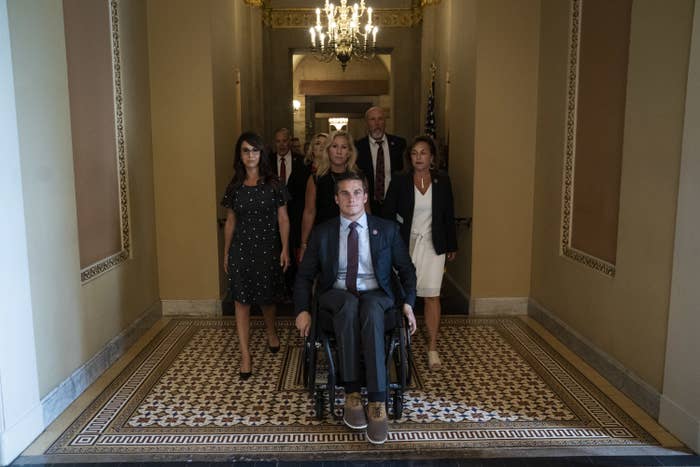
WASHINGTON — Joining an insurrection or rebellion against the United States can disqualify a public official from continuing to serve, a federal appeals court ruled Tuesday. But the court left unresolved whether that part of the US Constitution could, or would, apply to politicians who played a role in the events surrounding the Jan. 6 attack on the US Capitol.
The decision from the US Court of Appeals for the 4th Circuit is a loss for Rep. Madison Cawthorn, who had argued that an 1872 amnesty law passed by Congress meant that the disqualification language in the 14th Amendment — which also had its roots in the post–Civil War era — didn’t apply to future insurrections or rebellions. The appeals court disagreed with Cawthorn’s interpretation, reversing a lower court judge.
But the appeals court didn’t get into some of the more specific questions posed by Cawthorn’s case, such as whether Jan. 6 was, at least in the eyes of the federal judiciary, an “insurrection” or whether Cawthorn’s actions around Jan. 6 — or those of other members of Congress who backed former president Donald Trump’s lies that the election was stolen because of widespread fraud — could disqualify him from future office. The 4th Circuit also left it to a district judge to decide if Cawthorn’s primary loss should end the legal fight altogether.
Cawthorn isn’t the only member of Congress to face a Jan. 6–related ballot challenge. Rep. Marjorie Taylor Greene, a prominent proponent of baseless election fraud theories, recently fended off similar claims from Georgia voters that she should be disqualified from running for reelection under the 14th Amendment.
The case involved Cawthorn’s recent — and ultimately unsuccessful — reelection bid. The North Carolina Republican faced a challenge before the North Carolina Board of Elections from voters who argued that he had encouraged the mob that assaulted the Capitol, disqualifying him under the 14th Amendment. The section of the amendment at issue states that a person can’t hold office if they took an oath to protect the Constitution and then “engaged in insurrection or rebellion against the same” or gave “aid or comfort to the enemies thereof.”
The amendment’s insurrection language had its origins in the immediate post–Civil War era, as Congress tried to figure out what to do with public officials who had backed the Confederacy. A few years later, however, Congress passed the 1872 Amnesty Act, which stated that the disqualification language “imposed” by the 14th Amendment was “removed,” with exceptions for members of Congress who were in office during the Civil War and other categories of high-ranking officials.
The question that Cawthorn’s case raised was whether the 1872 amnesty law only applied to Confederate supporters who had been covered by the 14th Amendment’s disqualification language, or if it served as a type of future amnesty too.
US District Judge Richard Myers II went with the latter interpretation, finding in a March decision that the 1872 amnesty law did apply to Cawthorn, which meant that state officials in North Carolina couldn’t consider a disqualification challenge based on the 14th Amendment. But in Tuesday’s decision, the 4th Circuit disagreed, holding that Congress’s use of the past tense word “imposed” kept the amnesty law rooted in the past.
“To the contrary, the available evidence suggests that the Congress that enacted the 1872 Amnesty Act was, understandably, laser-focused on the then-pressing problems posed by the hordes of former Confederates seeking forgiveness,” Judge Toby Heytens, confirmed to the 4th Circuit under President Joe Biden, wrote in the court’s majority opinion.
Heytens wrote that the carve-outs in the 1872 amnesty law, which included members of the 36th and 37th Congresses, who would have served between 1859 and 1863, was proof that the amnesty was limited to the Civil War period.
“Having specifically decided to withhold amnesty from the actual Jefferson Davis, the notion that the 1872 Congress simultaneously deemed any future Davis worthy of categorical advance forgiveness seems quite a stretch,” Heytens wrote, referring to the former senator who would become the president of the Confederate States (emphasis in the original).
Cawthorn’s lawyer, James Bopp Jr., did not immediately return a request for comment. A spokesperson for Free Speech for People, an advocacy group that backed the challenge brought against Cawthorn by state voters, also did not immediately respond but posted a statement calling the decision a “major victory.”
Cawthorn could ask the full 4th Circuit to reconsider the three-judge panel’s decision or petition the US Supreme Court to hear the case.
Cawthorn had filed a notice with the court a few days ago about his primary loss and took the position that the case was moot; courts generally only decide live issues. In a footnote, Heytens pointed out that the primary winner hadn’t been officially certified yet. The appeals court ultimately left it to the district court judge to decide if the case was moot and should be dismissed — although the race is over for Cawthorn, Heytens wrote that Myers could decide if the fight presented an issue “reasonably likely to recur” that the courts still should rule on.
Judge Julius Richardson, confirmed to the 4th Circuit under Trump, wrote separately that only Congress could make qualification judgments about its own members, so he thought Myers was wrong to delve into the 14th Amendment question at all.
Judge James Wynn, confirmed under former president Barack Obama, wrote his own concurrence to disagree with Richardson, saying it created “a flawed blueprint for courts to stonewall the reasonable efforts of States to prevent frivolous candidates from running for congressional office.” Heytens’ majority opinion made clear that the court wasn’t officially deciding the question of whether only the House of Representatives could make constitutional disqualification judgments or if states could play a role as well.
